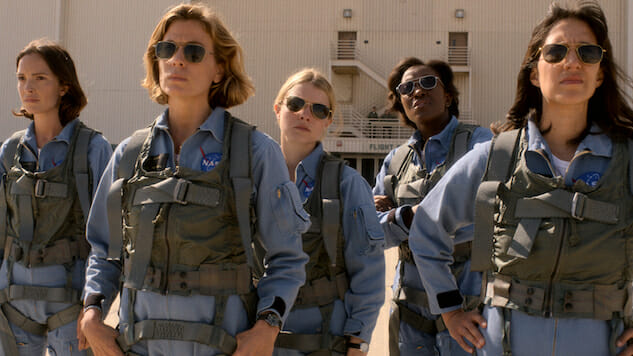Why For All Mankind Is an Alternate Reality that Might Be Better Than Ours, in the Long Run
The ambitious Apple TV+ series aims to rewrite history.

On the soundstages where Apple TV+’s For All Mankind was shot earlier this year, it was 1969 down to the most minute detail. Each set, from Mission Control to the offices of NASA engineers to the living rooms where families watched as their loved ones blasted off into space, was a well-constructed recreation of the era, and each time I stepped into a new location, it was transportive.
And not just to a different world, but to a different reality. The series, created by Ronald D. Moore, Matt Wolpert, and Ben Nedivi, takes place in an alternate universe which begins when Russia happens to beat the United States to the moon in 1969, setting off a chain of events which may ultimately change the world we live in dramatically—maybe even for the better.
During the few minutes Moore and I spent chatting on one of the show’s spacecraft, he painted a picture of a world where the space program became a major American priority. Given that the research and development NASA does has always found earthbound applications, such as solar batteries and clean energy, Moore said he believes that if the space program had been as big a priority in our real timeline as it is in the alternate history of For All Mankind, even bigger advances, such as the end of dependence on fossil fuels, might have been possible. “If big resources had been dedicated to that, that would help us in terms of climate change, and so on,” he said.
It’s not just technology that the show aims to rewrite, though. For All Mankind does aim for authenticity within its premise, and thus, it has to address societal issues, such as the fact that in the year 1969, it frankly sucked to be a woman or a person of color.
“It was a challenge for me to wrap my head around, being a modern-day woman—I find pride in being independent. That’s where I get my strength from,” Shantal VanSanten said. The actor plays Karen, devoted wife to Apollo 10 astronaut Ed (Joel Kinnaman), and she knows that “looking back, they had a very different perspective on women. Karen is of service to Ed and his dreams and his life, but it’s where she truly finds fulfillment as being a mother and being a wife and a homemaker and creating this safe space where he can go out and dream and aspire.”
It was something VanSanten found “really beautiful,” thanks to memories of her grandmother, but at the same time she realized that her character was “what we gauge our progress against—she’s the one stuck in the past, which was a definite challenge for me.”
When it comes to playing a woman in this time period, star Wrenn Schmidt said, “I like to say it’s a series of handcuffs that we’re all wearing, especially if you’re a professional woman in the 1960s. There’s a lot of balls to keep in the air—almost every scene, you not only have to be thinking about like who you’re talking to, whether or not they’re your superior or not, but also like whether or not it’s okay for you to say what you’re saying given the time period—whereas I wouldn’t think twice about that now.”
Kinnaman observed that “they always kept it rooted in the time. So even though there is social change, because of a spark that comes sooner in our world in this new timeline, it’s still rooted in the the attitudes and where people were at that time. So there’s a lot of conflict. And it’s not just, you know, showing a happy future where, you know, there’s no problems. It’s not that at all, but it’s just what would happen if we just, like made certain decisions a little differently. What kind of progress could that spark?”
That’s what becomes a major part of the narrative, something which sets the show apart from other projects set in the past. “When you’re dipping your toe into the world of period filmmaking, which I’ve actually done a lot of in my career, it usually does come at a cost of being an appendage to a man,” cast member Jodi Balfour said.
However, in the early episodes of the series, a major factor is the fact that the Russians not only beat America to putting a man on the moon, but also succeed in sending a female cosmonaut first as well. (In reality, at no point in human history has a woman even orbited the moon, let alone landed on it.)
Moore said that the idea was that, if women were a part of the space race sooner, “that would shake things up—that once you put women into spacesuits and put them in the program, and suddenly they’re held up as major American heroes, that that would sort of shift our system and society, and in ways large and small.”
-

-

-

-

-

-

-

-

-

-

-

-

-

-

-

-

-

-

-

-

-

-

-

-

-

-

-

-

-

-

-

-

-

-

-

-

-

-

-

-








































